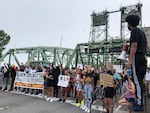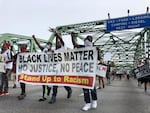
Protestors stand on the north end of the Interstate 5 bridge on June 19, 2020. Southwest Washington has a very recent history with police violence, which civil rights organizations continue to question.
Troy Brynelson / OPB
The public outcry came quick when Eileen Quiring, Clark County, Washington’s top elected official, denied systemic racism existed locally.
The NAACP’s Vancouver chapter was among the critics, but the group's president, Bridgette Fahnbulleh, said she wasn’t surprised by the comments made June 24. After a month of global unrest, a denial like Quiring’s felt unavoidable.
“They may have to do a little work,” Fahnbulleh said.
The county councilor’s apparent about-face – she had signed a resolution condemning systemic racism just eight days prior – seemed part of a familiar pattern to civil rights organizations. Police brutality provokes a reckoning. Changes come fast at first, then slow with time.
“We’re currently en vogue because it matters today,” said Ed Hamilton Rosales, president of the League of United Latin American Citizens. “But we all have a short-term memory.”
In Southwest Washington, civil rights organizations say they have made strides in the last month. Like many communities, protests allowed a re-examination of the region’s historical injustices.
Volunteers are flocking to organizations like the NAACP Vancouver and LULAC, and events like car parades and virtual Juneteenth celebrations are finding audiences in droves.
But people seeking change face a challenge as they try to keep Southwest Washington’s leaders, who are almost exclusively white, engaged.
Related: Top Clark County Official: 'I Do Not Believe Systemic Racism Exists In Our County'
“Black and brown folks have not been ignoring (these issues)," said Shareefah Hoover, who chairs NAACP Vancouver's legal redress committee. "We can’t afford to. We live it every day and have been talking about it all along.” She said that means pushing for greater accountability and reforms.
Rosales said organizations like his have to keep the topic “in front of everyone.”
“That doesn’t mean we want to continue yelling and screaming and ranting and raving, but if it takes that, yes, absolutely,” he said. “It’s a movement now. It’s all-hands-on-deck, regardless of your skin color, to make significant changes that affect all of us.”
A spate of police shootings in winter 2019 are a constant reminder to advocates who say change is needed. Organizations still feel law enforcement haven't faced consequences.
A quest for information
From Feb. 5 to March 7, 2019, the Vancouver Police Department shot four people. Three people died. Two of the deceased were people of color and the third was a man experiencing homelessness.
At the time, people called for more police de-escalation training and for body and dashboard cameras, as previously reported by OPB.
Civil rights organizations, meanwhile, demanded more answers surrounding the shootings. Families disputed officers’ accounting, such as identifying 43-year-old Carlos Hunter as a gang member.
“We had complaints from the individuals’ family members saying, ’No, (he) didn’t have any current ties to a gang,’” said Lynn Marzette, the former chair of the NAACP Vancouver's legal redress committee. “He’d been living – in their opinion – a reasonably crime-free life.”
Hunter died of multiple gunshot wounds. According to the autopsy by the Clark County Medical Examiner, he had between 18 and 20 bullet wounds in his chest.
Related: After 4 Police Shootings, Vancouver Community Demands Answers
Southwest Washington groups also questioned the circumstances that led a Vancouver police officer to shoot 16-year-old Clayton Joseph. Joseph was breaking up a fight in his apartment building. Police said he was brandishing a knife and refused to drop it as he approached an officer.
On March 22, 2019, the NAACP and LULAC leveled around 30 direct questions about the department’s use of force. How many police shootings in the last 25 years involved people of color? How many were armed with a gun or a knife? How many citizen complaints had been lodged against officers?
The letter resulted in nearly 10,000 pages of records of police shootings – including multiple times officers euthanized roadkill. The records were produced over months. Marzette said the response was, at best, poor customer service. Fahnbulleh and Rosales felt deliberately overwhelmed.
“If you give me (thousands of) pages and tell me ‘Go fish,’ then you make me suspicious. Unnecessarily – because maybe the answer is, ‘There is nothing to see here,’” Fahnbulleh said. “So answer the question.”
Through a spokesperson, Vancouver Police Chief Jim McElvain said he understands it can be frustrating to receive “a mountain of information,” but he was following protocol.
“The intent is not to burden the requester, but to ensure we provide all responsive records as required by law,” he said.
McElvain noted the police department offered to talk to the groups about the records, but heard nothing back. The groups said they endeavored to read the records first, and were still reading by the time the coronavirus pandemic began.
“As community members, we were not happy with that approach at all,” Marzette said. The NAACP's and LULAC's questions were never answered directly.
Likewise, talks of body and dashboard cameras went dormant. Clark County Sheriff’s Office tasked an intern to look into the budget questions. But, by late summer, things went “quiet,” Sheriff Chuck Atkins said.
“Things just kind of went on its merry course. There was no push at that time for them, other than from me, to say I had no objection to them,” he said. “Although I know it’s going to be a fairly large cost, and an ongoing cost.”

Protestors head north on the Interstate 5 bridge on June 19, 2020. Southwest Washington has a very recent history with police violence, which civil rights organizations continue to question.
Troy Brynelson / OPB
Answers come to light
Willingness to once again look at equity and criminal justice issues returned in June, sparked by recent deaths of Black Americans, including George Floyd and Breonna Taylor, at the hands of police.
Locally, the momentum gave way to changes sought by civil rights organizations. As a coalition, this June 12 they criticized the investigation of yet another Vancouver police shooting two months prior.
“The repeated acts of unnecessarily deadly Vancouver police violence that consistently go exonerated by the Clark County Prosecutor’s Office gives us no faith or confidence in the capacity for a thorough, objective investigation by local law enforcement or other criminal justice parties in Clark County or the greater Southwest Washington region,” the coalition wrote.
Related: Vancouver Civil Rights Groups Want More Police Oversight After Fatal Shootings
This time, however, change came quick. Within days, Clark County Prosecutor Tony Golik obliged and sent the investigation to Thurston County’s prosecutor. He defended his office’s past rulings but agreed that prosecutors reviewing cases of local police shootings does not instill confidence.
“That part of the system does not give confidence that there is true independence,” he told OPB.
There was optimism, Fahnbulleh said. She helped organize a car parade June 6 to support protests against police brutality. The Columbian newspaper reported about 1,500 vehicles showed up.
“You could breathe for a minute,” Fahnbulleh said. “I was with my daughters and I just took a deep breath and said, ‘Yeah, OK, there are people out there who give a damn.’”
There were other successive victories. After civil rights organizations raised concerns, the sheriff’s office agreed to remove decals from cars that had become associated with the “Blue Lives Matter” movement. The decals had been on their vehicles for four years. The sheriff acknowledged they could be divisive.
Volunteers have flocked to the civil rights organizations as well, representatives said. The city of Vancouver hosted listening sessions about race. Rosales said he’s being asked to join more community organizations. As an advocate for communities of color, he said he’s busier than ever.
“I find they’re asking me for more input because I am a person of color, and me giving that input because I am a person of color,” he said.
Meanwhile, some of the answers the groups sought a year ago have come to light. An external report published June 19 found Vancouver police’s use of force rose by 65 percent from 2017 to 2019. The report couldn’t explain why.
The Police Executive Research Forum, which led the report, did highlight that a small number of officers comprised a disproportionate share of the cases. Some officers were responsible for more than 25 uses of force in those two years. The firm recommended Vancouver use data better to identify and review such officers.
Neither LULAC nor the NAACP’s Vancouver chapter have commented on the report yet.
'Par for the course'
While the organizations started setting sights on other issues to press, they started to notice resistance.
On social media, local conservatives lambasted Atkins’ order to remove the decals as kowtowing to a “leftist mob,” and vowed to “give him hell” at the next election. Atkins is not running for re-election.
While Fahnbulleh and others discussed plans – such as employment diversity efforts at local governments – she said Quiring’s comments seemed to pull the emergency brake.
At the meeting, Quiring defended the decals the sheriff removed, arguing their removal was equivalent to saying the lives of law enforcement didn’t matter.
Related: Vancouver NAACP, Latino Group Call For Clark County Chair's Resignation
Then she said, “I do not agree that that we have systemic racism in our county. Period.”
To some, the statement underscored the problem. Adam Aguilera, a teacher and former candidate for Vancouver City Council, called the comment chilling.
“By denying systemic racism exists, she is in fact perpetuating racism and white supremacy in our culture,” Aguilera said. “For Eileen Quiring to believe systemic racism doesn’t exist, or Blue Lives Matter is what she believes in, is in fact showing you her racism by comparing a job to a human life.”
Calls for Quiring’s resignation have picked up. Both the local chapter of the NAACP and LULAC’s statewide offices officially demanded she step down. A petition has more than 5,000 signatures.
Quiring told OPB she doesn’t intend to resign and doesn’t regret her statement. She said individual racism may occur, but judges, law enforcement officers and staff don’t systemically discriminate, she said.
When asked if she supported Black Lives Matter, she said no. “Black lives do matter, but I don’t see that in this quote-unquote movement,” she said. “I think they’ve lost their focus. I think a lot of people are participating in this just because they want to be riotous.”
Vancouver and Clark County have not seen protests that resulted in clashes with police, unlike nearby Portland.
Quiring has resisted hosting a county listening session like the city has held, saying she would just get “beaten up” by the public. Councilor Gary Medvigy also called the response to Quiring's denial "divisive rhetoric."
Civil rights organizers said they won’t let themselves be slowed. As shown by the letter they sent to Vancouver police, Fahnbulleh said, they believe it’s important to keep asking leaders hard questions.
“Are we going to be really honest about this and have a conversation?” she said. “We’ll keep asking. We’re not going to stop asking. That’s par for the course. This is not a new thing.”
To Rosales, the question now is whether local leaders are willing to address systemic racism before them. He told OPB that, on a recent call with Vancouver officials, he refused to start until everyone shared their thoughts on the question.
“I’m confident we’ll find ourselves still leading the conversation on this,” Rosales said. “We recognize that if we want to take action, we have to take control of the narrative as well.”
It remains to be seen how things will unfold around Quiring, but some elected officials agree with the civil rights groups. When asked by OPB if he agreed systemic racism existed locally, Sheriff Atkins said yes.
“How could you deny it?”